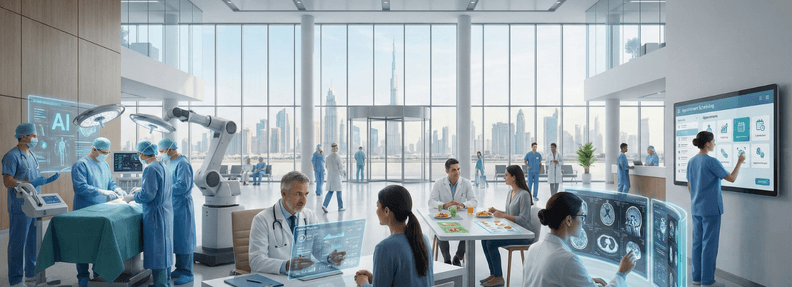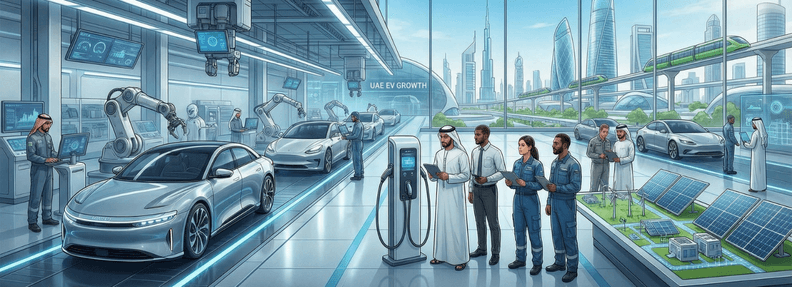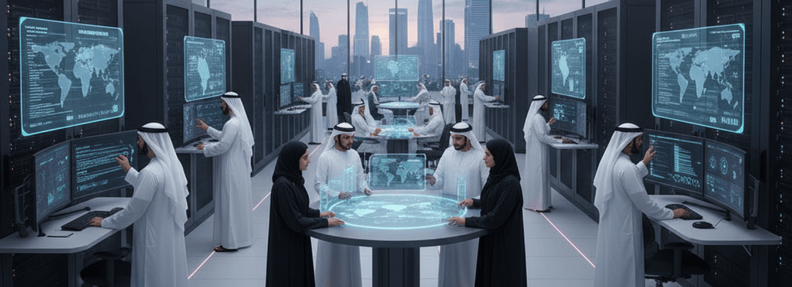
AI in UAE healthcare: What medical professionals should know
Table of Contents
- Undeniable Benefits of AI in Healthcare
- Government Vision Backs AI Integration
- Key Projects Demonstrating Adoption
- The Opportunity for Medical Professionals
- Why You Should Act Now
Undeniable Benefits of AI in Healthcare
AI and machine learning are transforming healthcare by improving the quality of care, reducing costs, and increasing efficiency. The technology helps make healthcare operations more efficient, improve user experience, diagnose diseases, monitor health, and connect disparate data(1). Wearable devices increasingly collect data on patients' health and wellness, monitoring vital signs, tracking physical activity, and providing real-time feedback(1).
A case study by Clemenceau Medical Center Dubai demonstrated three primary outcomes from applying AI: clinical, financial, and technological(2). AI allows hospitals to achieve decent clinical outcomes and enhance patients' overall experience, aids healthcare facilities in improving their financial performance, and represents a core source of profit for healthcare ecosystems(2).
The practical applications are impressive. Natural language processing can record doctors' notes, interpret medical histories, and analyze scientific literature more thoroughly than humans. Deep-learning algorithms applied to wearable sensors, genomic data, and medical information can develop personalized treatment plans(3).
Government Vision Backs AI Integration
The UAE government provides strong institutional support for AI in healthcare. The UAE accounts for almost 26% of healthcare expenditure in the GCC and has positioned itself as a leader in adopting AI technologies(2). The country is expected to add USD 182 billion to its economy by 2035 owing to accelerated AI adoption(2).
The Dubai Health Authority presented its AI policy in healthcare on September 15, 2021, with in-depth governmental and monitoring frameworks for using AI services and solutions(2). The policy aims to improve collaboration among government health agencies, private sector, and scientific community.
Abu Dhabi's Department of Health launched Malaffi, the region's first health information exchange platform, which uses AI and machine learning to improve healthcare delivery and drive improved patient outcomes(2). The Ministry of Health and Prevention established the health sector's inaugural Centre of Excellence for AI in 2023(3).
Demonstrating commitment to workforce development, the Global Artificial Intelligence Healthcare Academy has attracted and trained over 3,750 healthcare professionals from the Emirate's healthcare sector since its launch(4). Participants have completed programs designed to enhance AI capabilities and upskill proficiency in cutting-edge technologies.
The AI in healthcare market in the UAE is expected to reach US$ 137.9 million by 2030, with a compound annual growth rate of 34.6% from 2024 to 2030(5).
Key Projects Demonstrating Adoption
Several initiatives showcase the UAE's practical AI implementation. Falcon AI by the Advanced Technology Research Council, through its commercialization arm AI71, is being applied to revolutionize the healthcare sector(6).
Dubai Health Authority's EJADA AI system has achieved remarkable results through a preemptive disease prevention system(3). M42, a joint venture between Mubadala health and G42 healthcare, launched Med42, a clinical large language model that provides high-quality answers to medical questions(3). This followed their earlier release of the Arabic-enabled JAIS model, showcasing commitment to advancing healthcare through AI(3).
Thumbay Institute of AI in Healthcare hosted the region's first international conference on AI training and upskilling for healthcare professionals(3), demonstrating the sector's focus on education and adoption.
The Opportunity for Medical Professionals
Despite favorable AI policies, physicians in the UAE have limited experience with AI-based applications for enhancing patient outcomes(2). This gap represents opportunity.
While many medical professionals wait, those investing time in AI education position themselves ahead of the curve. The resources required aren't insurmountable—targeted training programs, government-backed academies, and institutional support systems already exist throughout the UAE.
Research shows key factors for successful adoption: physicians must control the applications and be fully trained and engaged in the testing phase. Healthcare systems need to be connected, and AI outcomes need to be easily interpretable by physicians(2).
In radiology, key factors include education and training, as well as awareness and acceptance. Radiographers should receive education to build essential skills, with AI instruction integrated into both undergraduate and continuing education programs(2). The same principle applies across all medical specializations.
Why You Should Act Now
AI has transformed from a distant concept to daily reality. Virtual medical assistants powered by AI can offer health coaching, shape diets, and even help prevent and predict illness(3). These aren't future possibilities—they're current applications that early adopters are already leveraging.
For future medical professionals entering the field, AI literacy isn't optional—it's fundamental. The healthcare landscape you'll practice in will assume AI competency as a baseline skill, much like computer literacy became non-negotiable in previous decades.
The question isn't whether AI will integrate into UAE healthcare—government investment, market projections, and institutional frameworks confirm it will. The question is whether you'll be among the professionals leading this transformation.



